Top 7 Cambodia Culture, Customs and Etiquette
Religion has consistently been a significant source of cultural inspiration in Cambodia throughout its lengthy history. Over nearly three millennia, Cambodians ... read more...have combined their native animistic beliefs with Buddhism and Hinduism to create a distinctive culture and religious system that is uniquely their own. Around the first century AD, the Indian culture and civilization, with its languages and arts, reached the continent of Southeast Asia. Here is the list of Cambodia Culture, Customs, and Etiquette.
-
The customary greeting for Cambodians is a prayer-like clasping of the palms. That is one of the lists of Cambodia's culture, customs, and etiquette. They bow gently and raise their hands to chest height. It is known as Som Pas. Generally speaking, the more respect is being offered, the higher the hands and lower the bow. Cambodians will say Som Pas and Choum Reap Sur when they meet (Hello). They will once more say Choum Reap Lir and Som Pas as they leave (Goodbye). Som Pas is a greeting and a way for Cambodians to show respect. It would be rude to not respond to a Som Pas when it is being used as a greeting; in Western society, it is equivalent to declining a handshake that has been extended.
Western cultural impact is now recognized in Cambodia. Men in Cambodia frequently shake hands. As Cambodians are not used to touching, especially those of the opposite sex, women frequently stick to the customary greeting and are hesitant to shake hands. Many Cambodian women in the United States still avoid shaking hands, particularly the older generation and recent immigrants.
When addressing someone formally, Cambodians use the titles Lok (Mr.) or Lok Srey (Mrs. ), followed by either the person's given name alone or both the given and family name. The family name is rarely used alone, unlike in the West. As an illustration, my name is Keo Mony. My given name is Mony, and my family name is Keo. Please address me as Mr. Mony.
Informally, Cambodians address older men as Ta (grandfather), Po (uncle), or Bang (brother) and older women as Yeay (grandmother), Ming (aunt), or Bang Srey (sister). In situations where one is unsure of the ages of the other participants, they are frequently employed to show respect for the person who may be the senior. In Cambodia, it would be considered impolite or otherwise inappropriate for a younger person to address an older person without using a title. A fifteen-year-old boy would address his thirty-year-old neighbor as Sokha Po Sokha or Bang Sokha, for example. Without the use of a title, those who are the same age or younger may be addressed by their given name.Since this is no longer the custom, persons may now use these titles to greet others in public in order to express differences in social or professional status as well as seniority or age. For instance, while greeting their younger caseworker who works for the hospital, senior patients frequently use one of these terms.
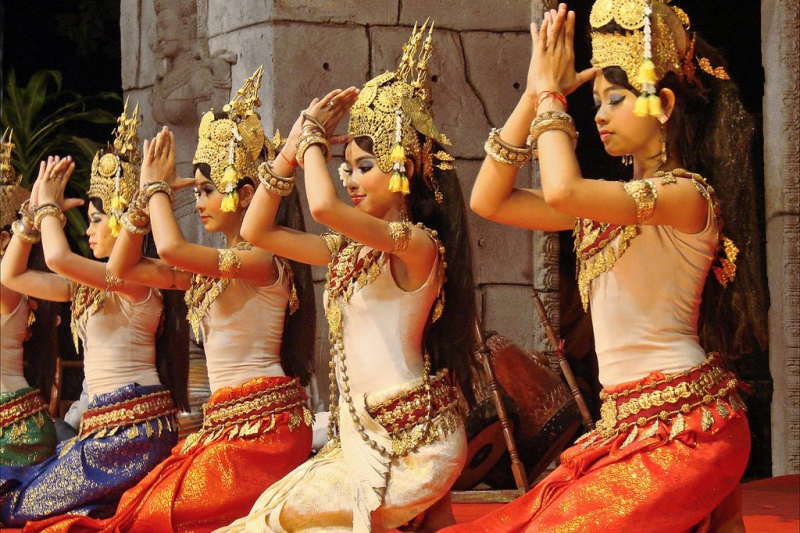
vietvisiontravel.com 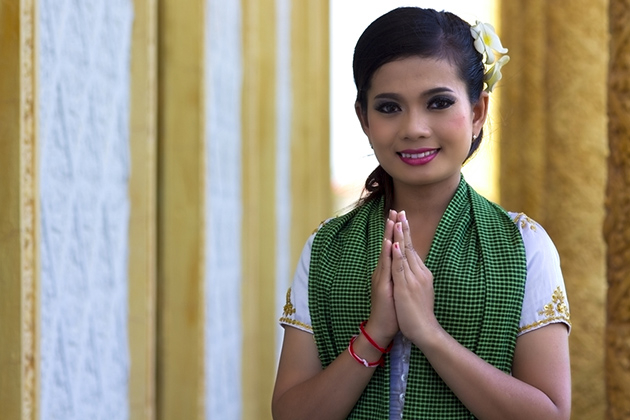
vietvisiontravel.com -
Theravada Buddhism predominates among Cambodians. Cambodian society has benefited greatly from the contributions of Buddhist monks. The teachers and counselors are frequently monks. The Wat serves as the hub of the neighborhood. The majority of Cambodian communities have a wate. Wat is also present in many communities of Cambodian Americans. Some Wats are simply apartments that have been transformed. When visiting a wat or conversing with a monk, keep in mind the following dos and don'ts:
- Shoes or sandals must be removed before entering a wat regardless of one’s status in society; this includes the king.
- Visitors should be appropriately attired. Men should wear shirts and pants; they should never go shirtless or in shorts. Women should not wear short skirts, low-cut or open dresses that reveal the body, very colorful clothing, or too much perfume.
- Inside the Wat, visitors sit with their legs bent and both feet tucked to the side, saying Som Pas and bowing to the floor three times.
- Women cannot touch a monk. If a woman wants to hand something to a monk, the object should be placed within reach of the monk, not handed directly to him. This restriction even applies to a monk’s mother.
- Monks sit on a platform or raised seat above the laity. However, if there is no platform or raised seat, monks are also allowed to sit on the floor or mat, if they sit upon a pillow or folded blanket, which symbolizes a higher seat.
- Visitors always sit with their legs bent and feet tucked under when the monks are seated.
- Never stand when talking to seated monks. It shows grave disrespect.
- A Buddha statue, well kept or in ruins, is a sacred object, so do not touch it or stand on the altar.
- A monk can be addressed with “Venerable” followed by his first name or whole name (last and first).
- Monks eat only breakfast and lunch, which have to be finished before noon. In the evening, monks are allowed to drink water, milk, or tea. Any schedule or engagement should take this restriction into account.
- Food intended for monks should not be tasted before the monks eat it.
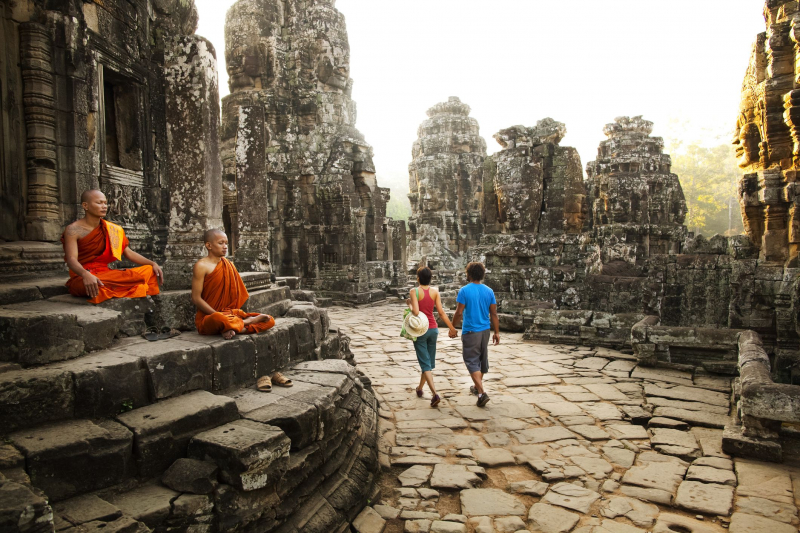
tripsavvy.com 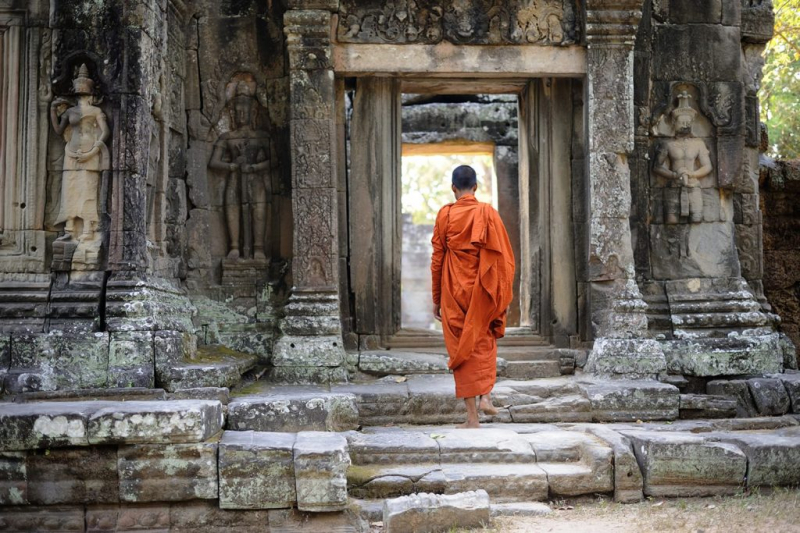
tripsavvy.com -
When you go to someone else's home, you will probably be given tea and possibly some food. Accept the offer, show respect for the host, or even just taste it. It is one of the lists of Cambodia's culture, customs, and etiquette. Bringing a small gift, such as fruit or flowers, is considered polite.
Before entering, visitors need to take off their shoes. Cambodians always insist on taking off their shoes, even though it is not required and even if the host asks them not to. It's done to be respectful. Hats must be taken off. Instead of wearing hats for fashion, Cambodians do it to protect themselves from the sun or rain. Hats should never be worn inside a house. Cambodians regularly offer their guests beverages like water, tea, or juice, as well as food occasionally. Even if the visitor only consumes a sip or a bite, the offer is nevertheless accepted out of respect for the host. Some homes employ beds or mats for hosting visitors. If so, guests should sit with their feet tucked under them. Stretching or crossing one's legs is rude.
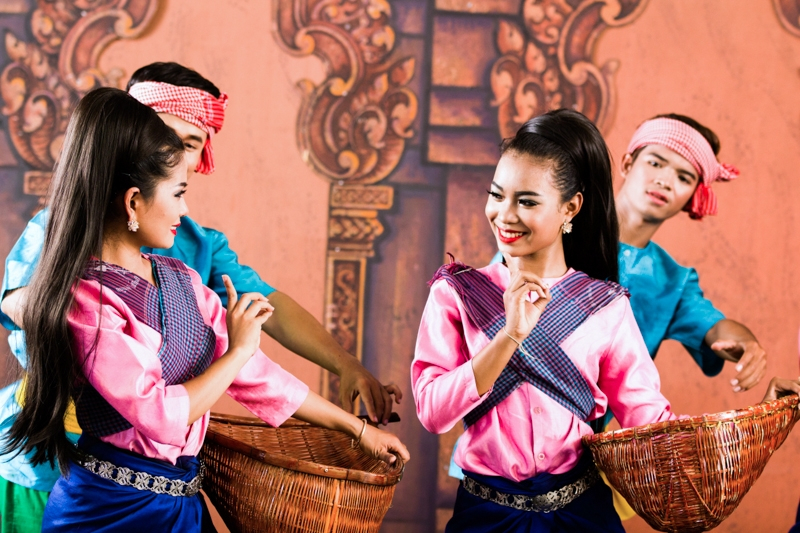
boyeatsworld.com.au 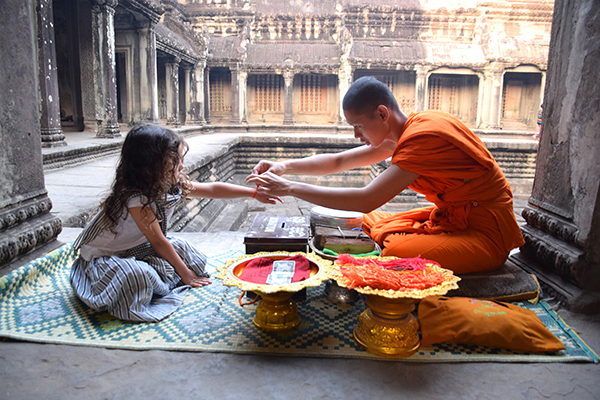
boyeatsworld.com.au -
Cambodians demonstrate great respect toward their elders. This respect for the elderly is taught very early in life. Always, the younger individual approaches the elderly first. In contrast to a younger host who would Som Pas a visiting elder first, a guest would Som Pas his or her elderly host upon entering the home. The younger person shouldn't be seated higher than an adult. The younger individual should be seated at the same level as the older person or slightly lower. It would be deemed impolite or misbehaving to sit above the seniors. Mats are still frequently used in many American and Cambodian houses, in addition to chairs or couches. It is rude for a younger person to sit on a chair, even if they are told to do so, if an older person is seated on a mat. The young people should bend their legs and tuck them to the side with both feet pointing backward when sitting on a mat. Younger folks shouldn't cross their legs while sitting on a chair or couch or shake their legs.
A younger person should bow to a senior when passing or strolling in front of them. The more reverence is expressed, the lower the bow is. The younger individual must use both hands to receive items from or give items to the elderly. An older person will do it using just one hand.
It is inappropriate to stroke or touch the elder's head. Cambodian parents usually teach their kids that it is wrong to touch or pat someone else's head since it is considered sinful. A younger person should never place their hand on the shoulder of an older person while standing or posing for a photo. It is seen as extremely impolite. Remove headgear before speaking, and keep your hands out of your pockets. Don't begin eating before the senior.
Even with all the changes, elder respect is still highly valued in Cambodia. On the other hand, in the United States, it appears that younger generations are losing regard for the elderly. Children interact with other Cambodians less frequently as a result of the busy work schedules of many parents. If Westerners show respect for Cambodia's seniors, they will be greatly appreciated and revered.
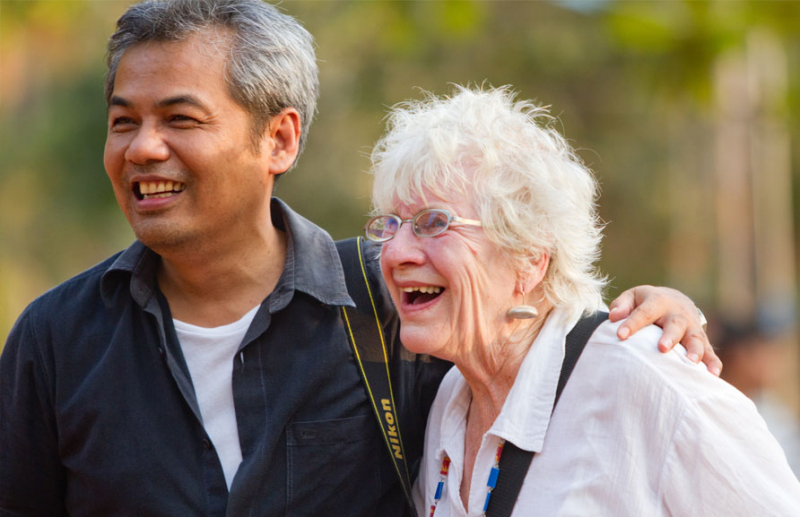
dccam.org 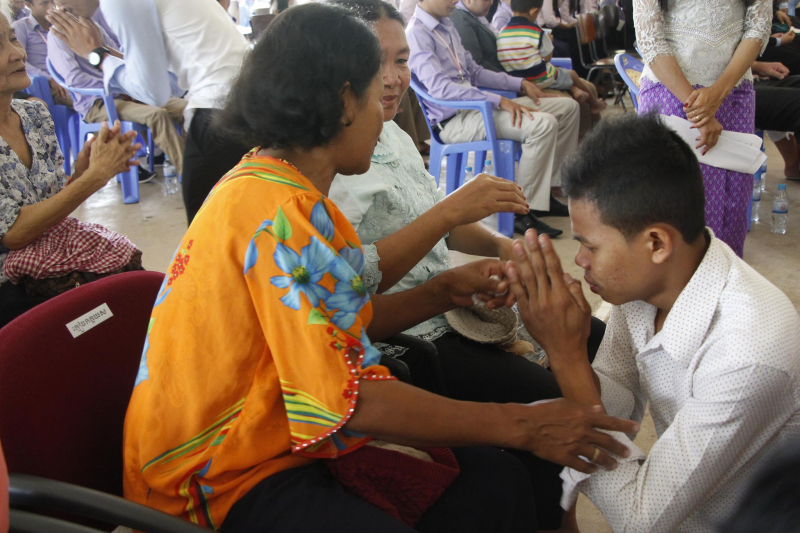
dccam.org -
Since Cambodians often smile or laugh in both good and bad circumstances, it shouldn't be assumed that they are automatically expressing joy, agreement, amusement, humiliation, or derision. To prevent misunderstandings, extreme care should be exercised while interpreting a smile or chuckle.
Cambodians are thought to be reserved, particularly the women. When attempting to have an honest and open conversation with their patients, healthcare professionals should take this into account. The favored sex providers are the same.
For Cambodians, preventive medicine is unusual. Many Cambodians still view healthcare as a luxury they cannot afford. The long-held adage "if nothing is broken, don't fix it" contributes to Cambodians' reluctance to use preventive treatment.
Cambodians have endured unspeakable violence and suffering as a result of thirty years of horrific conflicts. Many Cambodians suffer from chronic mental diseases. However, because it would make them appear weak, Cambodians are not accustomed to talking about or expressing their emotions, especially men. They also compare crazy behavior to mental disease. The stigma associated with being labeled as crazy is severe. As a result, Cambodians are frequently unwilling to discuss their experiences and any associated ailments.Whether it be for marriage or health, counseling is an unfamiliar concept to Cambodians, particularly counseling provided by a qualified or certified counselor. Advice is frequently requested from a monk, a traditional healer or herbalist, or the abbot. The community has respect for both laypeople who organize religious healing ceremonies (known as "aa-jaar") and traditional healers or herbalists (known as "kru-Khmer"). They are regarded as community leaders.
For the treatment of various types of ailments, many Cambodians continue to rely primarily on traditional healers and traditional or herbal medications. In Cambodia, it is simple and affordable to purchase modern medications. In actuality, no prescription is required to buy them. However, many people cannot afford them. Roots, barks, and animal bones are used to make traditional medicines. Many different diseases, including AIDS, are said to be cured by them. Traditional medical practices are unrestricted. Many Cambodians still utilize the traditional remedies they are accustomed to in the United States. They can be ordered from Cambodia or found in many grocery stores.People in charge are typically feared in Cambodia. According to culture, fear is first taught within the family at a very young age. In addition to in school, children are also taught to obey at home. They are not permitted to question their parents' authority, particularly the father, at home. Cambodian society continues to be predominately male. Teachers should not be pushed outside of the classroom. Later, bosses are in charge at work. Obedience is the norm. Additionally, authoritarian rulers whose power cannot be contested and foreign occupiers have ruled Cambodia throughout its history. For those who dare, punishment has always been fast and severe. Many Cambodians have been conditioned to fear all of their lives.
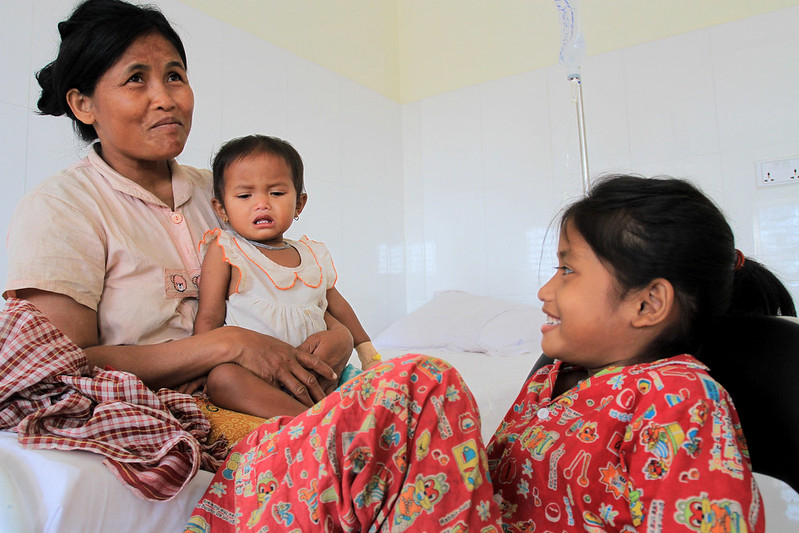
ethnomed.org 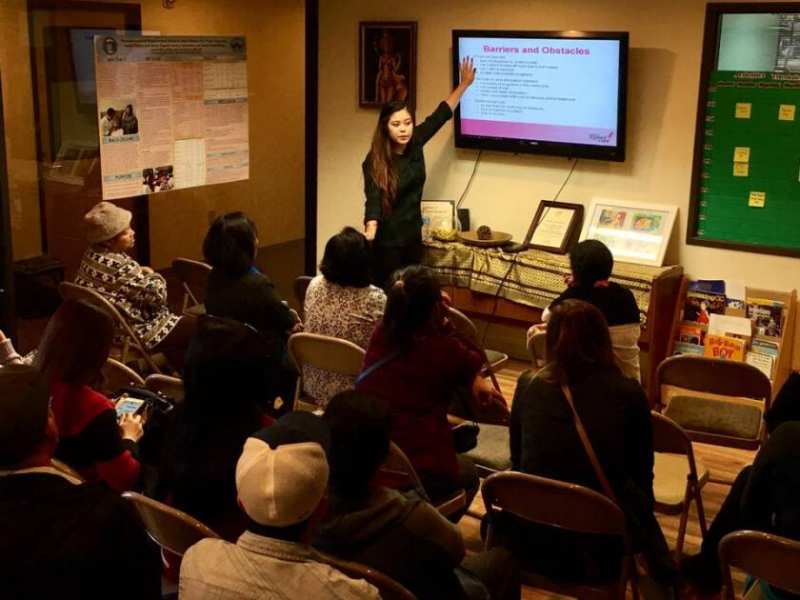
ethnomed.org -
Nearly 90% of people identify as Buddhists. Knowing the fundamentals of Buddhist etiquette is essential if you want to respect the local faith and its holy sites. Cambodian etiquette is heavily influenced by the ideas of karma, collectivism, and maintaining one's face (the last is common throughout Asia). That is one of the lists of Cambodia's culture, customs, and etiquette. People are compelled by karma to act morally in order to be lucky and lead fulfilling lives. The concept that the group is more significant than the individual is what drives collectivism. The idea of saving face is comparable to the western concept of keeping a good reputation.
Temple etiquette:
- Remove your shoes before entering a temple.
- A Buddha image is considered sacred, so do not touch it or stand on its altar.
- If you are sitting inside a Wat, tuck your feet beneath yourself.
- Dress in an appropriate way: cover your shoulders and knees.
How to save face:
- Compliment people when deserved.
- Respect others in order to be respected in turn.
- When someone is giving you a gift, politely refuse at first, but accept it in the end.
- Do not insult anyone and do not talk behind his or her back.
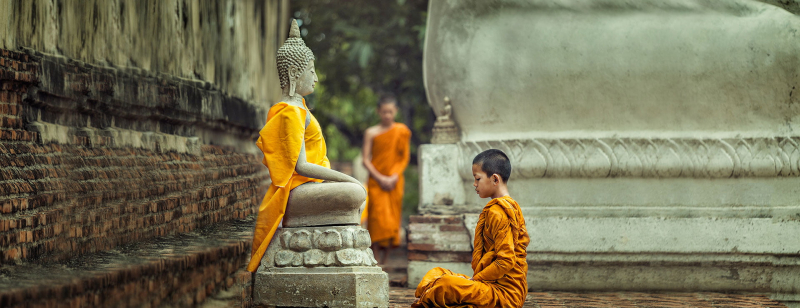
indochinapioneer.com 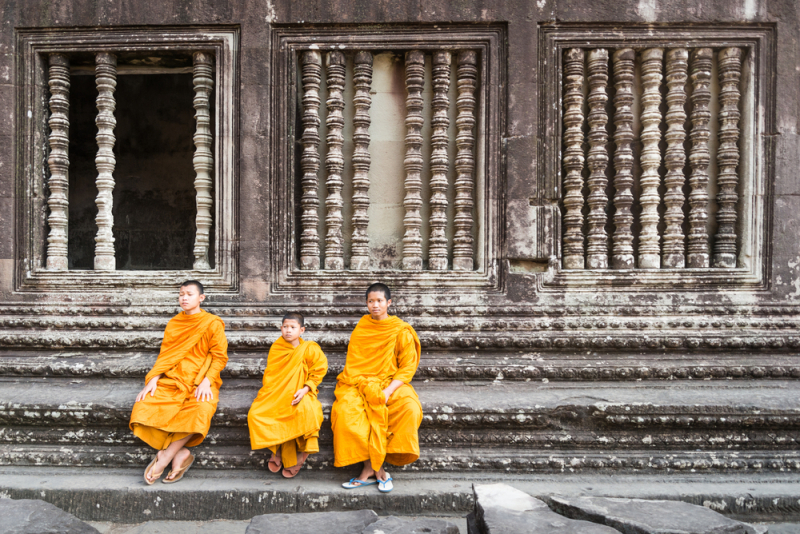
indochinapioneer.com -
It's crucial to dress appropriately, especially when visiting a temple. A Buddhist strives to conceal as much skin as possible when entering a temple. Your upper arms and upper legs should be covered. While ladies should avoid flashing too much skin, they often cover their shoulders and the most of their legs. Men typically wear a shirt and long pants. It is one of the lists of Cambodia's culture, customs, and etiquette.
Visitors to Cambodia should refrain from donning skimpy attire. Cambodians dress conservatively, thus visitors should try to do the same to avoid offending anyone. Due to the extreme temperatures and humidity, jeans are not advised. Pants made of cotton and linen are a better choice.
In Cambodia, going visiting temples is a common tourist activity. The appropriate attire for visiting holy sites must be understood by visitors. When visiting temples, it's vital to dress conservatively. Visitors must cover their shoulders and legs. Long-sleeved attire is advised, and visitors may also bring a pashmina or other fabric to cover up with before entering a temple or other place of worship.
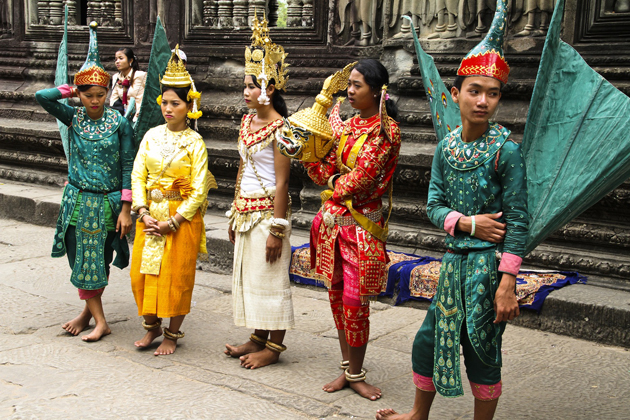
tripleacambodia.com 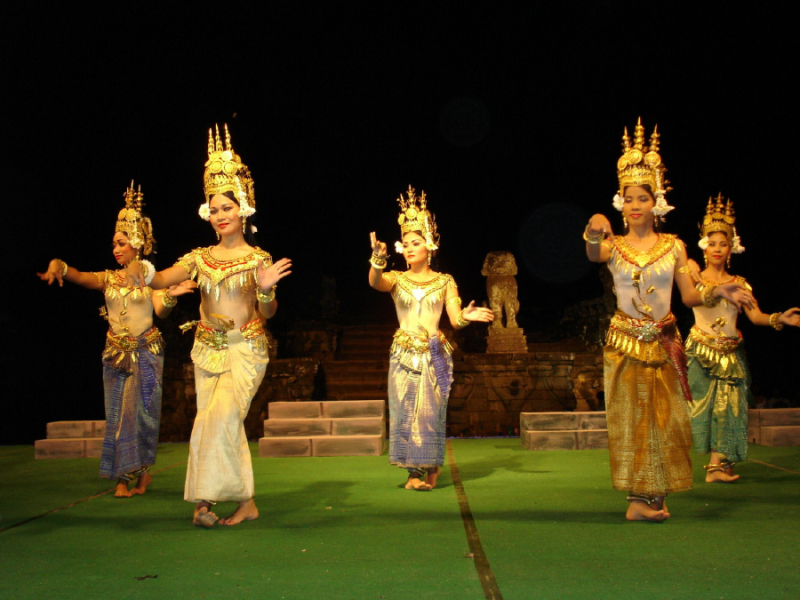
tripleacambodia.com





























